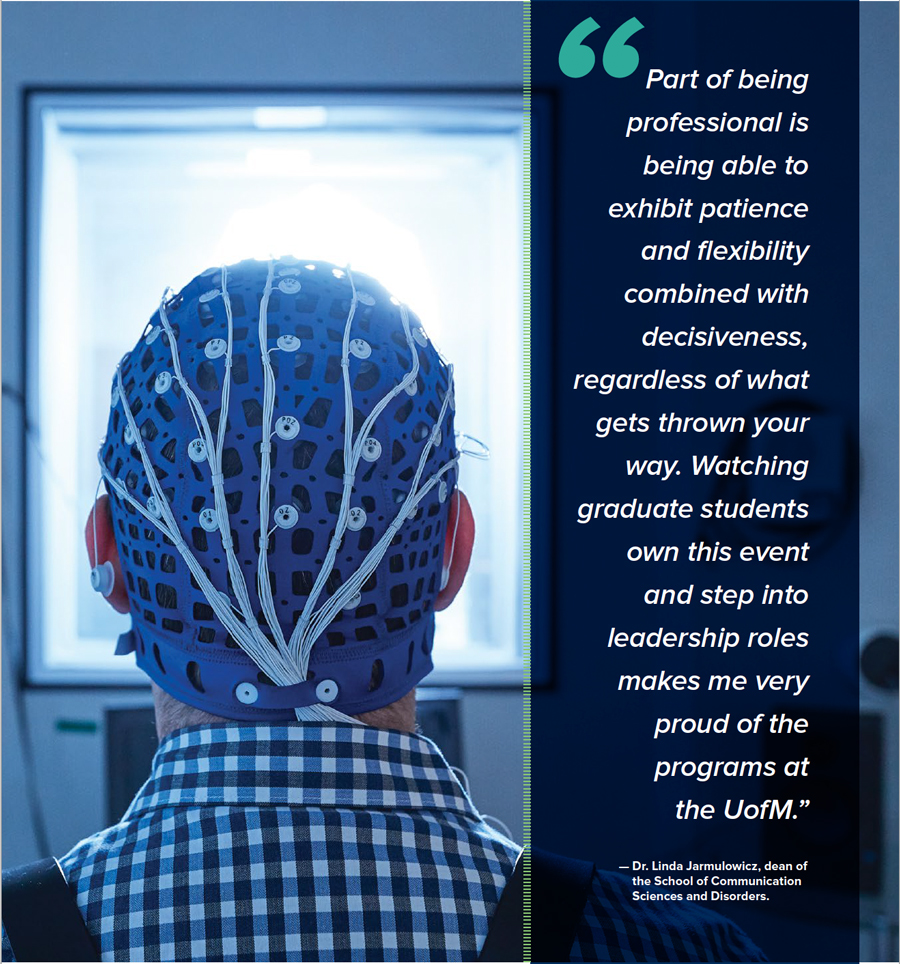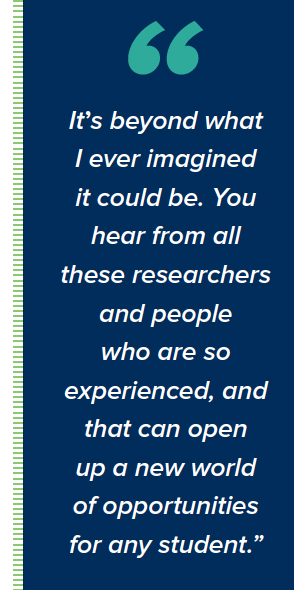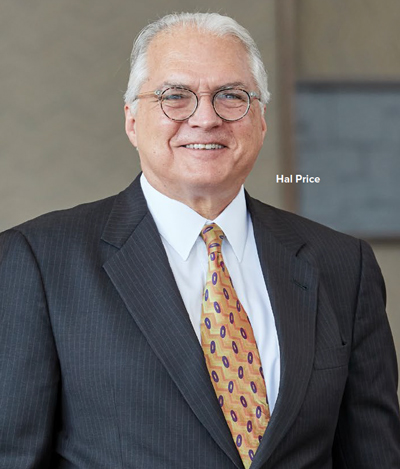By Trent Shadid
The demands on a University of Memphis graduate student in the School of Communication Sciences and Disorders are immense.
In addition to their studies, these young professionals pursuing degrees in Audiology and Speech-Language Pathology are taking on a client caseload for the first time, preparing for comprehensive exams and contemplating decisions regarding their upcoming career paths. The school itself presents high standards with its Audiology (No. 20) and Speech-Language Pathology (No. 31) graduate programs ranked among the best nationally by U.S. News and World Report.
Now imagine being tasked with planning the largest student-organized conference of its kind in the country in conjunction with all these challenges. That’s exactly the case for 11 students each year who serve as board members in the UofM’s National Student Speech Language Hearing Association (NSSLHA) chapter.
The Mid-South Conference on Communicative Disorders celebrated its 50th anniversary in early March, making it the longest-running conference within communication disorders organized by students. The two-day event has a strong clinical focus and is designed to supply practicing audiologists and speech-language pathologists in the Mid-South with a broad range of information on current research, evidence-based practice, new concepts and more. More than 500 professionals regularly attend to hear from nationally and internationally recognized guest speakers.
It’s quite a production for these students to undertake. The work starts nearly a year in advance after the NSSLHA board members are nominated and elected by their peers each April.
“It feels like it never stops once the election process begins, but it’s a very rewarding experience,” said Leah Margaret Strope, an Audiology student who served as hospitality chair for the 2020 conference.
“When election time came for 2020, I was encouraged to run but I was hesitant at first. I had seen the demands on my older classmates who organized the conference the previous year. When it came down to it, I decided to just go for it, and I’m so glad I did.”
 The demand on the student organizers pays off through networking opportunities and
expansion of skills they may not otherwise develop. Students are in contact with accomplished
leaders of their future professions as they work to book speakers, provide accommodations,
make schedules and more.
The demand on the student organizers pays off through networking opportunities and
expansion of skills they may not otherwise develop. Students are in contact with accomplished
leaders of their future professions as they work to book speakers, provide accommodations,
make schedules and more.
Caitlin Price (AuD ’17) served as the UofM’s NSSLHA Audiology co-chair in 2015, and is set to complete a PhD in Hearing Sciences and Disorders from the University in August. As Price began the process of searching for future work, she recalled her year spent assisting with the Mid-South Conference to help make better-informed decisions.
“When you’re working on the conference, you get to contact some of the top professionals in our field,” Price said. “That gave me an idea of how some of those people work, how things work at various universities, what different departments are like, and that definitely has provided me with some advantages for where I’m at now as I search for jobs.”
That peek into the lives of professionals in their field also gives students a chance to analyze and consider different specialties. Audiology and speech pathology are broad research areas with several categories of expertise.
“As an incoming grad student in our fields, you often have a narrow view of what you may be able to do,” said Justine Steele, a Speech Pathology co-chair for the 2016 conference and a current clinical instructor at the University.
 “When you meet all these people who have been working in the field for years, you
gain a new perspective on what all is out there. It’s beyond what I ever imagined
it could be. You hear from all these researchers and people who are so experienced,
and that can open up a new world of opportunities for any student.”
“When you meet all these people who have been working in the field for years, you
gain a new perspective on what all is out there. It’s beyond what I ever imagined
it could be. You hear from all these researchers and people who are so experienced,
and that can open up a new world of opportunities for any student.”
The development of organizational skills is among the greatest challenges facing these young professionals. The coordination of such an event is some of the most important preparation for the students’ future whether they realize it at the time or not.
“I’ve seen, and experienced myself, how the conference helps to build some character,” said Robin Van Nortwick (MA ’89), UofM Communication Sciences and Disorders Alumni Club president.
“In our professions, it’s so important to be a very detail-oriented planner capable of juggling multiple things. Planning the conference while you’re in this grad school teaches you how to develop those abilities at a critical time in life.”
The reputation of the conference grows each year. Many prominent professionals accept invitations to share their knowledge without hesitation — the result of top-notch hospitality and the prominence of the UofM’s School of Communication Sciences and Disorders.
“The caliber of professionals, teachers and students is very known in the professional community, and that’s a major draw,” said Danielle Keeton (MA ’00), director of Outpatient Rehabilitation and Developmental Services at Le Bonheur. “That’s always been the culture around here. Whoever is at this University is advanced in the field, and there’s always been a lot of stability in that aspect. That continuity and reputation draws a lot of people back every year.”
A FOUNDING MEMBER
 Hal Price (BS ‘71, MA ‘73) was a part of the first student cohort to organize the
Mid-South Conference on Communicative Disorders in 1970. Price is currently the senior
vice president of Sales & Marketing at Aegis Therapies. Here’s how the conference
got started, in his own words:
Hal Price (BS ‘71, MA ‘73) was a part of the first student cohort to organize the
Mid-South Conference on Communicative Disorders in 1970. Price is currently the senior
vice president of Sales & Marketing at Aegis Therapies. Here’s how the conference
got started, in his own words:
In the fall of 1969, one of our faculty members organized a bus trip to the American Speech and Hearing Association National Conference in Chicago. It was an extraordinary experience for all of us ... thousands and thousands of people. We didn’t ever want it to end. We came back to Memphis and we just started to wonder if we could do something like that.
One night, our student group met at our clinical instructor’s house to share ideas and eat pizza. We were really just thinking if we could keep the evening going as late as possible, we might be able to get a couple of days extension on a test we had the next day.
But that was when we really had a serious discussion about doing a conference. We sketched out a rough plan and we even, sort of jokingly at the time, came up with the name Mid-South Conference on Communicative Disorders. A lot of us weren’t from around Memphis and we always laughed about how everything was named Mid-South or Bluff City, so we decided we’d better put something like that in the name and it just stuck.
That first conference, we had probably 70 or 80 people attend, and it was certainly a success by our standards. For the second one, we really tried to take it to another level. We had it at the Peabody and more than 200 people attended, which was really great for us. We had some anxious moments, though.
Leading up to the conference, we just didn’t know if we’d get enough people committed in order to pay for everything. In those days, you got everything by mail. We would hang around waiting on the mailman every day. When the mail would come, we’d rip through it hoping for more conference applications.
About three weeks before that second conference, we didn’t have many people signed up. One of my closest friends and classmates, Karen “Cande” Steckol, and I were going back and forth about what to do. She was ready to cancel the conference and my personality is one where I kept saying everything would be fine. A couple of days after we had this big argument about it, I end up being rushed to the hospital with acute appendicitis. I don’t recall if this is true or not, but I am told that the last thing that I said before I went under the anesthetic was, “Don’t let Cande cancel the conference!” Everything worked out after we got a ton of applications about a week before the deadline.
It all started as a conference that was very focused on providing the best experience possible for speakers and attendees, and that’s remained the same throughout all these years.

